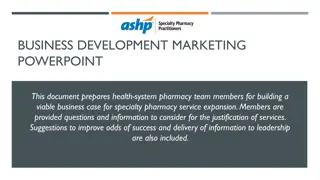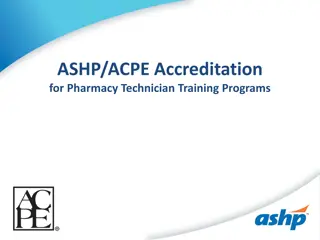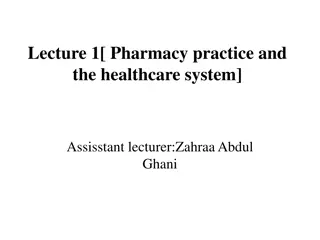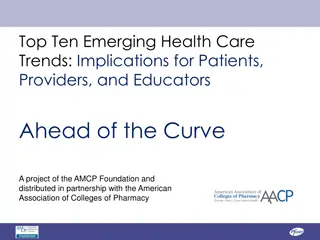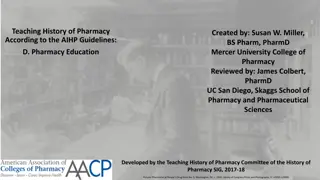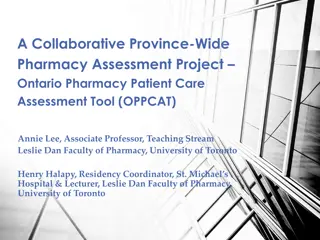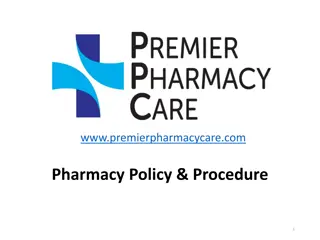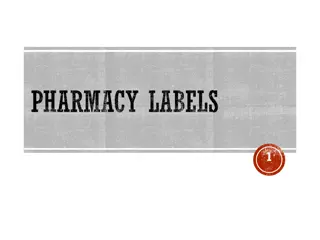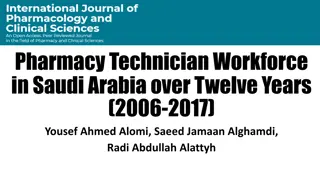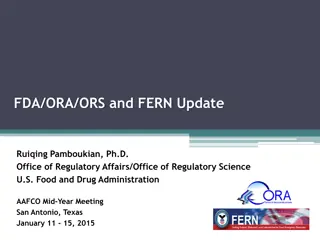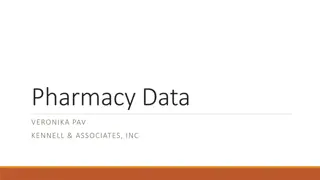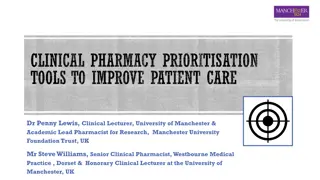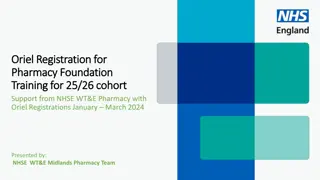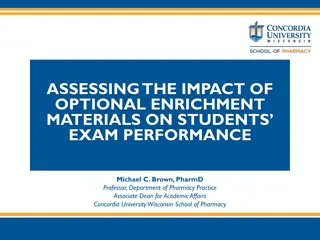Overview of Pharmacy Law and Regulatory Affairs
This comprehensive guide covers the definitions, licensing requirements, rules and regulations, drug classifications, establishment classifications, Ministry of Health licensing requirements, and general application and licensing requirements in the field of pharmacy law and regulatory affairs. It includes essential information for pharmacists, licensed assistant pharmacists, and those interested in the pharmaceutical industry in Oman.
Download Presentation

Please find below an Image/Link to download the presentation.
The content on the website is provided AS IS for your information and personal use only. It may not be sold, licensed, or shared on other websites without obtaining consent from the author. Download presentation by click this link. If you encounter any issues during the download, it is possible that the publisher has removed the file from their server.
E N D
Presentation Transcript
PHARMACY LAW & REGULATORY AFFAIRS
Definitions Pharmacist. Licensed Pharmacist. Licensed assistant Pharmacist. M.O.H Licensing requirements Bachelor degree / Diploma in Pharmacy or equivalent from a recognized university or higher institution. Experience ( 3 years for non Omani) Good conduct & character. License validity - ( 3 years for non Omani & life long for Omani)
Rules to be followed on regular basis Practice in predetermined location( i.e. practice the profession only in the Pharmaceutical Establishments) Manager at only one Pharmaceutical establishment. Any change in place of work must be reported to the MOH within 7 days from the date of the change. Combination of Pharmacy profession with other profession is unaccepted (except first aid services, training programme). Financial sharing is forbidden( between pharmacists and physician).
Drug. Prescription only drugs. Controlled drugs. Psychotropic drugs. Narcotic drugs
Classification of Pharmaceutical Establishments Public pharmacy In house pharmacy Medical store Pharmaceutical company Scientific offices
Ministry of Health Licensing requirements for Pharmaceutical Establishments General application requirements General licensing requirements Technical and health requirements
General Application Requirements The licensee should be an Omani citizen and not below 18 years of age. Comply with Health and technical requirements. Managed by a Licensed Pharmacist.
General Licensing Requirements Public Pharmacy 1. Must be situated in the ground floor. 2. Internal area not less than 25 square meter. 3. Ground floor ( level of the main road or the parallel of front road). 4. Distance requirements. (200 meters) 5. The entrance & front side of the Public Pharmacy shall be made of glass.
General Licensing Requirements In-house Pharmacy 1.The entrance should not be on the main road. 2. Internal area not less than 15 square meter. 3. No other Pharmacy in the same complex.
General Licensing Requirements Medical Stores 1.Internal area not less than 60 square meter. 2. Ground floor ( level of the main road or the parallel of front road, if any at the ground floor). 3. Scientific shelves and cupboard. 4.Tightly closed cupboard ( Poisons, narcotics and psychotropic substances). 5. Comply with health and technical requirements..
General Licensing Requirements Pharmaceutical Companies Shall comply with GCC- GMP standards.
General Licensing Requirements Scientific Office 1. Shall occupy independent space. 2. Shall have a store for keeping medical samples.
Technical Requirements for Public, In House Pharmacy and Medical Store 1. A tightly closed cupboard ( poisons, narcotics and psychotropic substances). 2. Refrigerator with a temperature thermometer.
Health Requirements for Public, In House Pharmacy and Medical Store 1.Building and the roof ( made of concrete and fireproof). 2. Floor ( covered by good quality tiles or natural or artificial marble with cemented joints). 3. Wall and ceilings ( oil painted). 4. Painting, lighting, cleaning, air conditioning and ventilation to be in good condition. 5. Thermometer ( premises and fridge). 6. A fire extinguisher and first aid box.
Health Requirements for Pharmaceutical Company Shall comply with GCC GMP and WHO GMP
Rules to be followed on a regular basis by Public and In House pharmacy 1. All essential medicines . 2. Cosmetics ( not greater than one third of the total area). 3. Items displayed in a well arranged manner. 4. Medicine samples, unregistered medicines or inconsistent with public morality and the pious teachings of Islam ( must not kept or trade in). 5. Insecticides and domestic sprays of different varieties. ( separate place or shelves). 6. Expired medicines or items must be kept in closed boxes stating Expired Medicines Not For Sale
7. The following shall be available: a. Display of licenses. b. Stamp of the pharmacist in-charge ( Registration number and Name). c. Pharmaceutical references ( ex: British pharmacopea, Martindale, BNF, ONF). d. Copy of the law, ministerial decisions and circulars. e. Registers ( Poisons, narcotics, psychotropic and controlled non psychotropic). 8. List of Pharmacies performing assigned day and night duties.
Rules to be followed on a regular basis by Medical Store 1.Medicines to be sold in their original container. 2. Compounding or manufacturing of medicines is not acceptable . 3. Medical samples should not be sold or traded in. 4. A record must be kept and maintained to list the quantities and numbers of medicines and samples received and disposed. 5. Separate places for inflammable materials. 6. selling of medicines ( only to governmental health institutions, and licensed pharmacies, medical stores and clinics).
Rules to be followed on a regular basis by Pharmaceutical companies 1. Not to be used for a purpose other than that for which it has been licensed. 2. Sale of medicinal products to Public or retail sale not acceptable. 3. Transportation of medicines ( adequate means shall be used). 4. The prescribed procedure shall be followed to ensure the safety and health of staff.
Rules to be followed on a regular basis by Scientific Offices 1. Promotion of medicines for human use ( licensed pharmacist or physician). 2. Promotion of medicines for animal use ( licensed pharmacist or veterinary physician). 3. Work area ( shall be confined to promoting medicines by distributing scientific bulletins and medical samples to physician and pharmacists).
Pharmaceutical establishments are prohibited from advertising about medicines through different means.
Pharmaceutical Technical Committees Pharmaceutical Licensing Committee: ( responsibilities) 1. Approval of licensing request for pharmacists and assistant pharmacists. 2. Approval of licensing request for Pharmaceutical establishments (PE) Pharmaceutical violation committee: (responsibilities) 1. Maintain professional standards. 2. Decide upon offences arising from non- compliance with pharmacy law.
Technical Committee for Registration of Pharmaceutical Companies: (responsibilities) 1. Approval of registration requests of pharmaceutical companies, products and pricing. 2. Recommendation on banning and trading of pharmaceutical products that will harm people and animals. Narcotic and Psychotropic committee: (responsibilities) 1. Execution of expired narcotic, psychotropic and plants contain them.
Inspection of Pharmaceutical Establishments To assure that all Pharmaceutical Establishments are following all the rules and regulations set by MOH. To assure that all health and technical requirements are met. To monitor and asses the performance of Pharmacist and Assistant Pharmacists.
Cancellation of the License for Pharmaceutical establishments If the establishment is exploited for purpose other than those shown in the license. Closedown for three consecutive months or six non consecutive months within a Gregorian year, without an excuse accepted by MOH. Transfer of proprietorship or shifting to another place or transfer of license without prior approval from the MOH.
MOH Registration of Pharmaceutical Companies, Products and Pricing Registration applied to : 1. Pharmaceutical companies. 2. Drugs including veterinary products. 3. Biological preparation including vaccine, serum. 4. Herbal preparation with medicinal claim or has medicinal value.
Registration requirements for Pharmaceutical companies cGMP. Routine Inspection done by the local health authorities in the country of origin. Products should be marketed in the country of origin. No illegal matters has been issued against the company. Pharmaceutical companies manufacturing herbal medicines are subjected to the above requirements as well.
Registration Requirements for Pharmaceutical products Pharmaceutical Company should be registered with MOH. Products should be marketed in the country of origin. Quality evidence of the Product In case of a product containing alcohol,the alcohol content should not exceed; 0.5% - less than 6 years. 5% - 6 12 years. 10% - greater than 12 years.
Cancellation of registration for Pharmaceutical Companies If the company does not submit product registration file with in a year from the date of registration of the company. Quality Control non compliance ( 3 products fail quality after repeated analysis). Loses one of the registration requirements.
Cancellation of Registration for Pharmaceutical Products If a particular product is unavailable regularly without valid reasons. Non compliance with bio equivalence studies ( if the product fails twice) Country of origin evidence ( harmful, ineffective, serious side effects , cancelled or banned).
Import and Export Pharmaceutical Products Pharmaceutical products importing requirements: 1. MOH registration. 2. Sponsorship ( to be imported under the name of governmental institutions or pharmaceutical establishments). 3. Product specifications. 4. Valid shelf life ( not less than 2/3. exception life saving products not less than ). ( samples of registration for MOH or for tender purpose are not subjected to the above requirements).
Pharmaceutical products exporting requirements: 1. MOH registration 2. Specification ( as registered or imported). 3. Valid shelf life.
Penalties Situation: 1. Anyone practicing the profession ( Ph or Ass/ Ph) in a way contradicting the pharmacy law and its ministerial decisions. 2. Dealing with any prohibited medicines, or any prohibited objects. 3. Submitting of wrong information or uses illegal ways to enable him / her to get a license or open a pharmaceutical establishments.
A Penalties: By court 1. Imprisonment ( max 1 year) and fine ( not greater than 1000 R.O). 2. Or any of the above penalties In all circumstances: 1. Practice license is Withdrawn temporarily or permanently. 2. Close down of pharmaceutical establishments and confiscation of medicines and items related to the violation.
B. Penalties ; By Pharmaceutical Violation Committee: 1. Warning 2. Fine not greater than 500 RO 3. Work suspension of Maximum of 1 year. In all circumstances: 1. Cancellation of the practice license. 2. Cancellation of the pharmaceutical establishment license. 3. Impose both penalties.
Controlled Drugs Classification ( narcotic and psychotropic). Plantation, manufacturing and production of CDs. Import, export, transportation and trading of CDs. Dealing of CDs. Prescription requirements. Register requirements.
Plantation of CDs: 1. Governmental authorities. 2. Special colleges and institutes. 3. Scientific research centers.
Import, export, transportation and trading of CDs. 1. Governmental authorities. 2. Special colleges and institutes. 3. Scientific research centers. 4. Pharmaceutical companies. 5. Permitted hospitals and clinics. 6. Permitted chemical or industrial labs.
Dealing of CDs. Only by pharmaceutical establishments and through licensed and authorized medical professionals such as doctors, pharmacists etc.
Doctors: A licensed doctor on an official prescription. Prescribing CDs must only be according to the treatment purpose and according to the scientific basis. Prescribing for self use is prohibited. Retain of some CDs for emergency use only ( pre approval is required).
Pharmacist : CDs should be kept in their Original Package and in a safe dedicated place. Expired CDs should be returned to the DGPA & DC. Patient: Possession in regard to medical reasons and within allowed prescribing limit. Assigning CDs to third party is prohibited. Unused CDs should be returned to the DGPA & DC.
It is an offence for physician to issue a prescription for a CD or for a pharmacist to dispense it unless it complies with the following requirements: A licensed physician. Prescription should be issued from a numbered prescription pad stamped from DGPA & DC. It should be in ink otherwise indelible and be signed,stamped and dated by the physician issuing it. Name of the Patient,age &address. Specify the direction of use. Specify the form & strength of the preparation. Total quantity should be written in both words & numbers. Prescription validity. Prescribing limit.
Prescription colour requirements Governmental Hospitals: 1. Narcotic - 2. Psychotropic - 3. Controlled non Psych - Normal. (Validity 10days) Private Hospitals, medical complexes and clinics. 1. Narcotic - Pink colour ( validity 1-3 days) 2. Psychotropic - Yellow colour (validity 3 days ) 3. Controlled non Psych - Normal.( Validity 10 days ) Pink colour (Validity 1-3days) Green colour (validity 3days )
Registers Two separate registers required Requirements: 1. Entries must be made in chronological sequence. 2. A separate part of the register should be used for each different drugs and strengths. 3. The name of the drug should be specified at the head of the each page.
4.Received quantity (pen with red ink preferably) 5.Day of the transaction (entry). 6.Erase & correction is prohibited. 7.Entries must be in ink or otherwise indelible. 8.Register must not be used for other purpose. 9.Separate register for each premise and should be available all the time. 10.The registers and other records should be maintained up to date and liable to be inspected at any time. 11.Shall be kept for 5 years from the last day of entry.






